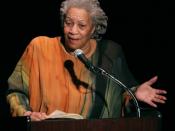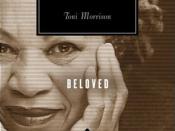In Toni Morrison's Beloved, the characters struggle with accepting the horror of their pasts in the world of slavery and moving on with their lives. Despite their theoretical emancipation, Paul D and Sethe are still enslaved, not only by continuing societal prejudices, but also their own need for self-preservation. A major part of that self-preservation is maintaining their hard-sought emancipation, not just from slavery, but from any type of bondage. Paul D upsets that precarious sense of freedom in his need for Sethe's too-thick love; consequently, he wrestles with the knowledge that allowing himself to love her would mean risking what is left of his strength and risking his license to roam. Paul D searches throughout Morrison's novel to preserve his freedom and his red heart stored in a rusty tobacco tin, but he nevertheless reaches simultaneously for Sethe's love, and the conflict between the two--love and self-protection--leaves Paul D in a quandary until finally he discovers that love is the ultimate freedom.
Paul D's need for freedom is easily understandable, particularly as a former slave, and yet his search for true freedom is not as simple as escaping the bonds of slavery. Fighting between protecting his "tobacco tin buried in his chest where a red heart used to be" and allowing himself to stay with and love Sethe, Paul D finds that both his wishes leave something to be desired. Paul D knows that entering into a relationship "might push them both to a place they couldn't get back from" and would let loose all the scary contents of the tobacco tin inside his chest. For Paul D, Sethe's scariest characteristic is her too-thick love. It threatens his very theory of existence, which is to love just a little; Sethe's love, particularly for her children,


